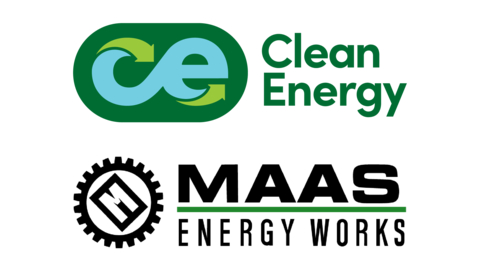Clean Energy and Maas Energy Works Join Forces to Build Nine Renewable Natural Gas Dairy Production Facilities Across Seven States

Clean Energy Fuels and Maas Energy Works Logos (Graphic: Business Wire)
This new endeavor will include dairies located in
The nine projects, each subject to finalizing diligence before beginning construction, are expected to be completed in 2026 and will produce up to an estimated 4 million gallons of ultra-clean RNG annually, a negative carbon-intensity transportation fuel which will make its way into Clean Energy’s nationwide network of RNG stations.
Industry pioneer Maas Energy Works has completed over 60 dairy digester projects over the past decade. The team specializes in lagoon cover digesters which involve a large tarp over a manure lagoon to capture the methane emissions. This process makes these facilities significantly less expensive to build and operate compared to tank digesters seen at other RNG plants. Financed by Clean Energy, the nine sites are forecasted to cost approximately
“This JV brings together expertise from a seasoned RNG developer and producer and Clean Energy’s extensive RNG distribution network and growing RNG customer base. We are excited to continue our long working relationship with the team at Maas Energy Works to get these facilities online and producing pipeline quality RNG to help supply our transportation fleet customers with clean fuel to help them meet their sustainability goals,” said Clay Corbus, senior vice president at Clean Energy.
“This joint venture is clear proof that family farms paired with private businesses are an unstopped force in achieving decarbonization. If the markets for renewable fuels are clear and consistent, then American’s biogas industry will deliver. We will soon be capturing fugitive manure emissions and turning them into carbon-negative truck fuel with our partners at Clean Energy," said Daryl Maas, CEO of Maas Energy Works.
Agriculture accounts for nearly 10 percent of
Forward-Looking Statements
This news release contains forward-looking statements within the meaning of Section 27A of the Securities Act of 1933 and Section 21E of the Securities Exchange Act of 1934 that involve risks, uncertainties and assumptions, including without limitation statements about: the benefits of the joint development agreement including the number, location and herd size of dairy digester projects proposed to be constructed, the timeframe for such construction and the anticipated investment pursuant to the joint development agreement; the amounts and timing of manure expected to be produced; the amounts and timing of natural gas expected to be produced or consumed; the relative cost of construction between lagoon cover digesters and tank digesters; the characteristics and performance of natural gas engines and trucks; the potential development of the consumer market for RNG; the environmental and other benefits of Clean Energy’s fuels; the availability of environmental, tax and other government regulations, programs and incentives; and the impacts of legislative and regulatory developments. Actual results and the timing of events could differ materially from those anticipated in these forward-looking statements. The forward-looking statements made herein speak only as of the date of this press release and, unless otherwise required by law, Clean Energy undertakes no obligation to publicly update such forward-looking statements to reflect subsequent events or circumstances. Additionally, the reports and other documents Clean Energy files with the SEC (available at www.sec.gov) contain risk factors, which may cause actual results to differ materially from the forward-looking statements contained in this news release.
About Clean Energy
Clean Energy Fuels Corp. is the country’s largest provider of the cleanest fuel for the transportation market. Our mission is to decarbonize transportation through the development and delivery of renewable natural gas (RNG), a sustainable fuel derived by capturing methane from organic waste. Clean Energy allows thousands of vehicles, from airport shuttles to city buses to waste and heavy-duty trucks, to reduce their amount of climate-harming greenhouse gas. We operate a vast network of fueling stations across the
About Maas Energy Works
Maas Energy Works is a family-owned business based in
View source version on businesswire.com: https://www.businesswire.com/news/home/20240514059909/en/
Clean Energy Media Contact:
Kimberly Fleer
1-949-437-1447
Kimberly.Fleer@cleanenergyfuels.com
Clean Energy Investor Contact:
Thomas Driscoll
1-949-437-1191
Thomas.Driscoll@cleanenergyfuels.com
Maas Energy Works Media Contact:
Dallas Spiecker
1-530-710-8545 ext 2105
dallas.spiecker@maasenergy.com
Maas Energy Works Investor Contact:
Stephen Hatley
1-530-710-8545 ext 2102
stephen@maasenergy.com
Source: Clean Energy Fuels Corp.






